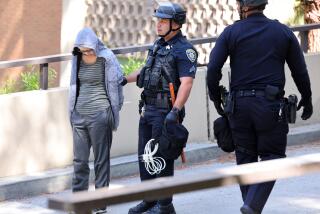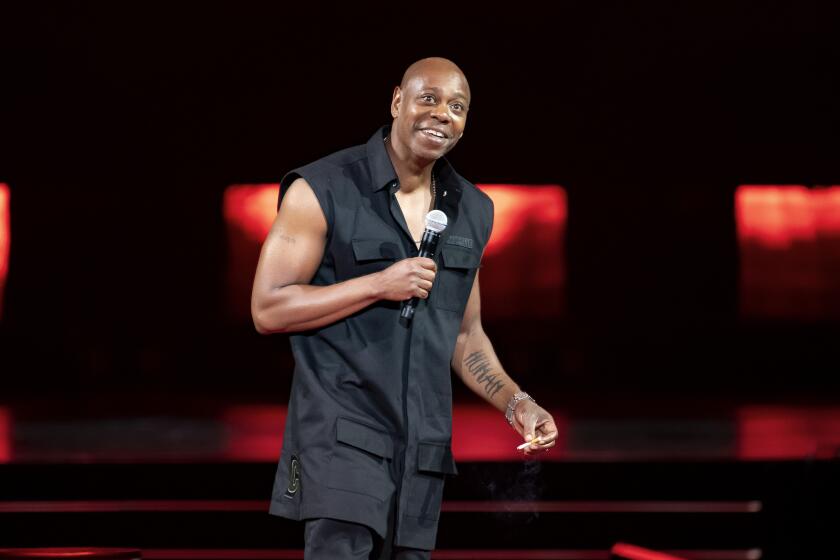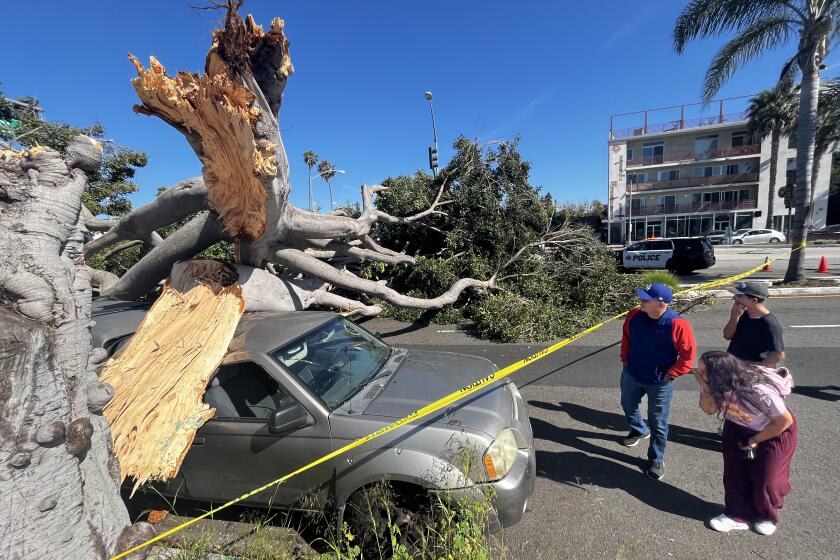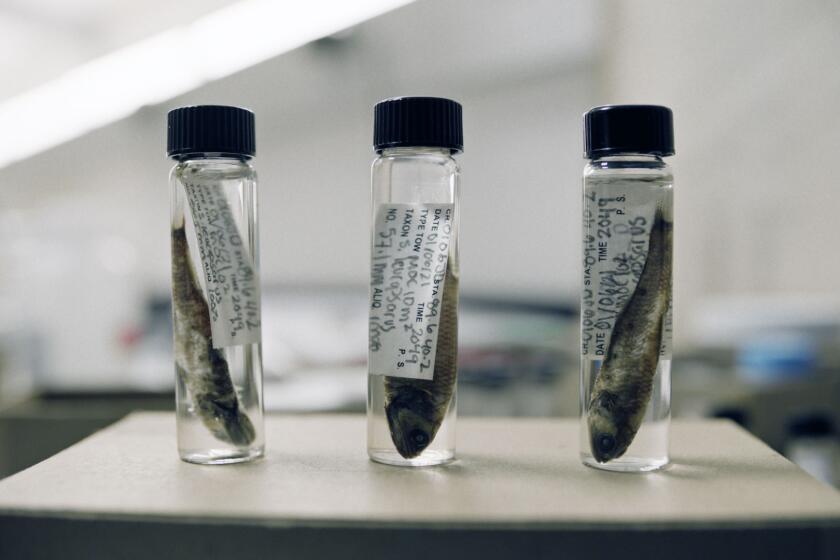Leaving His Turf : Gangs: After 10 years, Steve Valdivia is resigning from Community Youth Gang Services for health reasons.
After two decades as one of Los Angeles’ most prominent gang experts, battling the violence that has left thousands dead, Steve Valdivia now faces his own mortality.
Heart palpitations pound his chest at an irregular pace. An ulcer gnaws at his gut. Anxiety attacks leave him sweaty, gasping for air. Alcohol became a salve for pain and frustration.
“I’m 43 going on 90,” the executive director of Community Youth Gang Services said in a recent interview. “It’s just been a career of killing and bloodshed.”
At the urging of his doctor, Valdivia will announce his resignation Monday, capping a tumultuous tenure as head of the nation’s largest anti-gang agency. During the 10 years that he was at the helm, the gang population here more than doubled, nearly 5,000 people were slain and gangsterism evolved from a crime problem into a cultural phenomenon.
“He took it all very personally--a hell of a lot more personally than he probably should have,” said Los Angeles Police Lt. Bob Ruchhoft, a close friend who heads the Hollywood Division detectives. “I could see the devastating effect it was having on him, but he couldn’t just put it out of his mind.”
By Valdivia’s own admission, it nearly destroyed him. He was smoking a pack of cigarettes a day and not exercising. Death threats left him shaken. He could not bear to watch TV crime shows. When out on the streets, he sometimes borrowed an LAPD flak jacket.
He stopped talking to his wife about his work, hoping to spare her the anxiety. He stopped attending funerals, but was forced to make an exception last year when a cherished member of his staff was gunned down execution-style. In the end, Valdivia too had become a victim of the war he tried to stop--a mission that eats away at almost anyone who confronts the terrible toll of gang violence.
“A lot of times in this job, you don’t even realize how sick and stressed out you’re getting,” said Manuel Velazquez, a gang worker on Valdivia’s staff who has also been treated for tension-related medical problems. “Mentally, you don’t want to accept it. But then your body says: ‘---- you.’ You learn that trying to be Superman can kill you sometimes.”
Probably more than most positions, the job of managing Community Youth Gang Services requires walking an impossibly thin line.
Created in 1981, the organization was unlike any other--not a law enforcement agency or a traditional grass-roots group or a church-backed effort showering gang members with loving forgiveness. Yet its crisis intervention workers--many of them former gang members--were expected to perform their street counseling without alienating any of those constituencies.
The organization was blessed with generous contracts from both the city and county to mediate gang disputes, sparking resentment among other community groups that had to scramble for fractions of CYGS’s $4.5-million budget. But to secure that funding, Valdivia was regularly grilled by politicians, some of whom were skeptical of his organization and let him know it.
In its first two years, CYGS’s first two directors left amid controversy, while several of the intervention workers were linked to drug deals and gang shootings. Some law enforcement officials, who had expected the agency to assist their investigations, dismissed CYGS as a ragtag crew of semi-reformed hoodlums.
In subsequent years, Valdivia was credited with restoring the agency’s respectability and transforming the 100-member staff into a professional corps of trained counselors. But that only earned CYGS the distrust of some gang youths who branded it a snitch patrol for police--a charge that Valdivia has vehemently denied.
“You know, it’s a thankless job. I literally feel like I’ve been blindfolded and told to walk up a winding staircase, and at each step there’s an unseen person throwing kidney punches,” said Valdivia, who has been on medical leave from his $60,000-a-year post since Jan. 11.
The CYGS board of directors, which has begun a nationwide search to replace him, hopes to appoint a new top executive within about three months.
“You have to have double the energy, double the drive and double the heart to even attempt it,” Valdivia added as he sat wearing faded jeans, a silky green pullover and rose-tinted glasses in his suburban home--whose location he asked be kept confidential. “As soon as you lose your footing, or your nerve or your direction, you have to get away.”
His admirers say Valdivia will be remembered for rescuing an agency that was on the verge of collapse when he took over in 1983. He helped create CYGS’s much-imitated target-area strategy, which focuses efforts on small neighborhoods in collaboration with other government and community resources.
He was one of the early advocates of gang prevention, expanding CYGS’s approach to include school-based programs and other courses for at-risk youths. Oft-quoted, he used the media to urge greater attention to the social and economic conditions that fuel the self-destructive exploits of gangs.
“A lot of us are trapped in resignation, believing that any kid that joins a gang is ultimately lost,” said Bonnie Brody, a deputy to City Councilman Richard Alatorre, who worked with Valdivia to attack gang problems on the Eastside. “But Steve believed a lot of people were salvageable.”
His detractors--and they are plentiful--paint a picture of a paranoid bureaucrat who came to be known for mercurial mood swings, bullying tactics and back-room gamesmanship designed to protect his own flanks.
Chilton Alphonse, a Crenshaw district gang worker who is among his most persistent critics, has often accused Valdivia of bowing to political pressures at the expense of community interests. “If I had dreams of being a master manipulator, Steve Valdivia would be my hero,” he said.
Added Leon Watkins, a former member of Valdivia’s staff who resigned to start the Family Help Hotline: “He spent all his time trying to appease the political arena. The people we were trying to help were the last ones to be taken seriously.”
The harsh words pain Valdivia, if only because he believes he is in the same boat with his critics--all dedicated but underappreciated activists working to save the lives of youths who have been virtually written off by the system.
The third of five children born to an auto worker father and probation officer mother, Valdivia had little contact with gangs as a youngster. Family life in his San Fernando Valley community, he recalls, was middle-class and de-ethnicized.
It was not until he took a job as a welfare eligibility worker with the county Department of Public Social Services that he began to discover the rewards of working with the underprivileged. In 1972, he took a job with Cleland House, an East Los Angeles neighborhood service center, where he sponsored football games and boxing matches to ease tensions between rival gangs.
Over the years, he says, he has come to view the gang problem as the fallout of a racist society that frequently talks of giving up on the current generation of hardened youngsters without recognizing the roots of their antisocial behavior.
“Colors and turf are only excuses to kill and maim your mirror images,” Valdivia said. “It’s a hate crime--a self-hate crime.”
With time now on his hands, he says, he hopes to do some weed-pulling in his garden and rediscover his love of fishing. His needs--and those of his wife and teen-age daughter--will be covered by an insurance policy, he says.
Few know that he is an aspiring inventor, having developed an anti-gang comic book called “Star Kids,” a contemporary board game for children, a portable beach umbrella and an electronic pill box that sounds an alarm when it is time to take the next dose of medication.
He also plans to market a futuristic short story he wrote about gang life 20 years from now. According to his plot, the children have made peace while the adults have taken to doing the drive-by shootings. The kids urge their parents to put an end to the violence.
But no one listens to them.
More to Read
Start your day right
Sign up for Essential California for news, features and recommendations from the L.A. Times and beyond in your inbox six days a week.
You may occasionally receive promotional content from the Los Angeles Times.





